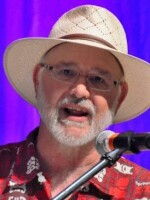Kelly Turner is Director of Transit for Springfield City Utilities: “We know our passengers. We carry a lot of the same people every day, and many of our passengers rely on us. Many of our passengers have no access to a personal automobile. We are the way they get around from day to day.”
Kelly Turner is a civil engineer by degree and trade and has served City Utilities as Director of Transit since June 2015. Turner was invited to the Sense of Community series to talk about the work and workers of the C.U. Transit System, and how and why C.U. keeps the busses running and seeks to improve its services even while operating in the red for decades. Kelly Turner says it wasn’t always that way. When C.U. Transit began operating in 1945, it was running in the black.
Kelly Turner: “Yeah, until the proliferation of the personal automobile, the transit system was heavily relied upon. Until the early to mid 1950’s the transit system made money. It was a money making operation. As personal auto ownership rose, public transit ridership changed both in number and in makeup. We went from in excess of 10 million trips a year in the early to mid 50’s, to around 2 million a year in the 90’s. So yeah, it was kind of a steady decline but then over the last 10-15 years it’s plateaued, and now we carry some one and a half million passengers a year. And we haul those same people every day that are trying to get to school; that are trying to get to work; that are trying to get to doctors’ appointments or do their weekly grocery shopping.”
On board the #2 bus, in line to depart from the main terminal west of Park Central Square, Marie Carr says she uses C.U.Transit a lot. “I get around. I have several places I go to including Harbor House and Wal Mart. Every day, several times a day sometimes, and I appreciate it too.”
Denise Moehring is driving the #2 bus to north Springfield today. She’s been with C.U. Transit for 15 months. “ I’d say about 10% of our passengers will get off at Wal-Mart and actually go into the store. Other than that we’ll pick up and drop off on the way. So we’re going to go out to Kearney and Glenstone area to the Wal-Mart. This #2 line does help a lot with the homeless getting to the Veterans Center. We pass the Courthouse and we get close to the Jordan Valley Clinic, but mostly get them to work just get folks where they need to go.”
Kelly Turner: “Transit serves the masses, and so however much you can make it more accessible to more people, I think is the goal. We have 2 types of service. We have a Fixed Route Service and the complimentary Para Transit Access Express curb to curb service for disabled individuals or those who can’t access the Fixed Route service. A one way fare, a single trip is $1.25. And there are different permutations where you can buy an all day, a 7 day, or a 31 day pass.”
But even with a million and a half riders a year paying a $1.25 per ride, plus a small amount of State support and a larger amount of Federal Transit dollars, there’s not enough money coming in for City Utilities Transit to break even, much less turn a profit, and yet the busses still run:
Kelly Turner: “The City Charter requires City Utilities to operate the public transit system. But aside from the fact that we are required to, C.U. management has a deep commitment to wanting to provide the public transit system. We really are committed and believers in the value the system provides the community. By and large, if someone is riding the bus, they are going to make money or they’re going to spend money. And so thereby the dollars we invest in the transit system repay the local economy as a whole.”
A four to one return, according to the American Public Transit Association. For more information about C.U. Transit, its current routes, proposed routes and plans for the future, including the new main transfer station under construction at 211 N Main, visit www.cityutilities.net










